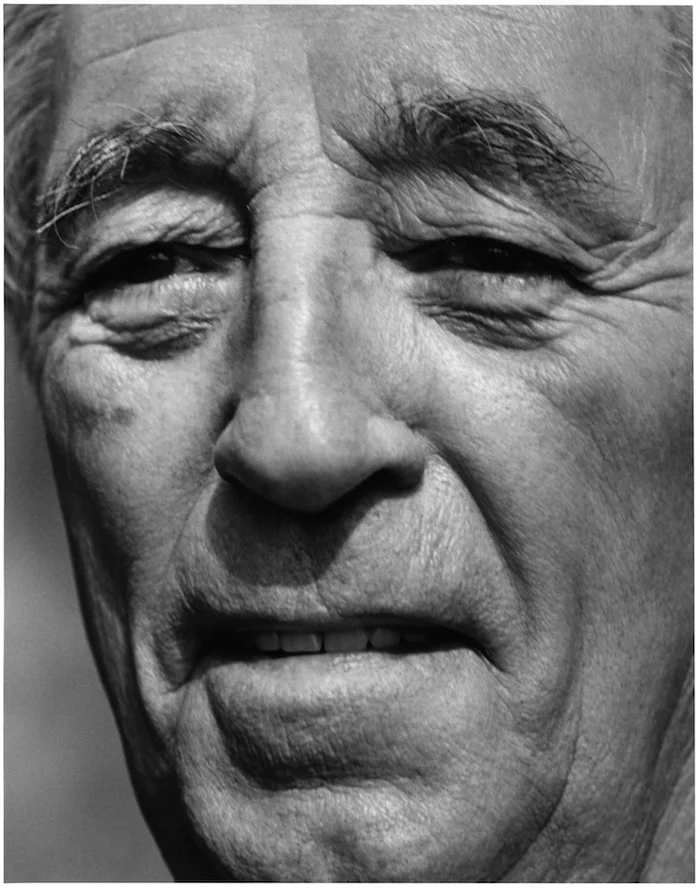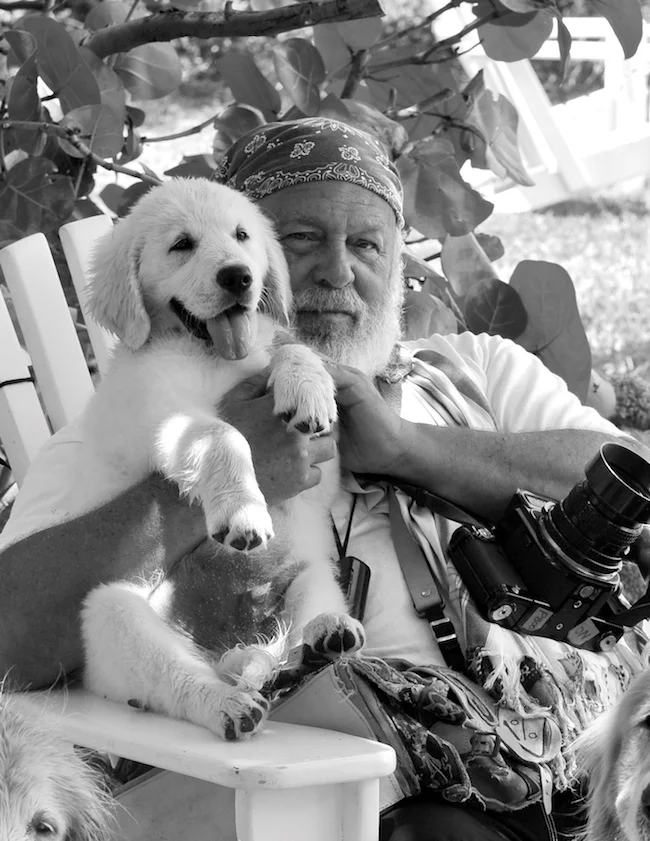As I sat down to meet legendary fashion photographer Bruce Weber I said "Mr. Weber, I can't say I grew up with your photographs because I'm older than I look, but I definitely grew into my sexuality thanks to your iconic images." It's true. Those NYC billboards in Times Square of underwear models for Calvin Klein, the Ralph Lauren "out of Africa" campaign, Kate Moss in the bathtub, the beach scenes and the catalogues I devoured before the advent of the internet -- I grew into my skin thanks to Weber's images.
Today, Weber has helped me to rediscover the beauty and genius of classic American actor Robert Mitchum. 'Nice Girls Don't Stay for Breakfast' screens at the Venice Film Festival in the Venice Classics section and is co-produced by Weber's wife Nan Bush. In the documentary, Mitchum is shown as never before, as a singer, a lover and a poet, aided in part by super cool cameos by Johnny Depp, Benicio Del Toro, Polly Bergen, Brenda Vaccaro, Marianne Faithful, Dr. John and Liam Neeson, among many many more.
So why a film about Mitchum, why from Weber and why now?
Because we seem to have truly and deeply forgotten what a man is, and is meant to be, in today's politically correct America. And perhaps at a festival here in Italy, with so many women's stories that are often told by brilliant men perfectly, we need to be reminded what it means to be part of that other fifty perfect -- a man. Vulnerable, imperfect, at times uncomfortable to be around, but still a man. We are so in tune with what the media thinks the world wants today that the pivotal line from the original George Cukor version of 'A Star Is Born' starring Judy Garland and James Mason -- "This is Mrs. Norman Maine" when Garland's character pays tribute to her late husband on stage -- is missing in the Lady Gaga, Bradley Cooper contemporary version. Why? Because a woman who identifies as a man's wife is frowned upon in our 21st century PC world.
And meanwhile it has never been a worse time for our collective humanity.
I caught up with the kind, intelligent, witty and generous Weber in person, in Venice. At once, I understood why Robert Mitchum trusted Bruce Weber enough to make a film about him. Because the photographer and filmmaker brought the movie star back to us, at a time when some of us need, we crave to be reminded of the importance of a true man.
You touch upon this in the film but why not choose James Stewart or some other movie star? Why did you make a film about Bob Mitchum?
Bruce Weber: I was just finishing ‘Let’s Get Lost’ with Chet [Baker] and Chet and I always talked about who our favorite actor was. And it was Robert Mitchum. He just reminded me so much of my dad, and my dad’s friends, that kind of independence that was so beautiful, which men had back then. They had a lot of pride and confidence and things like that.
Do you think Mitchum could survive as an actor, or even a man today?
Weber: Oh no. Definitely not.
It’s an insane time.
Weber: It’s a really hard time I think for anybody in the arts. He was a very introspective person and he was much shyer than you’d think he was. He was a really good writer, he wrote music, he was a singer, he wrote poetry…
I love that line where it says in the film that if a woman was lucky enough to be taken into his inner sanctum, his bedroom, she would find there his poetry and music. That’s a part of the actor we’ve never seen.
Weber: When you make a documentary you really get into the person’s life and also what is going on behind that life. And sometimes you say a prayer every day that it’s going to live up to your expectation. Bob never disappointed me and he only got better as I got to know him.
It’s poignant what you say, it’s how I feel when I do my job. I interview people and beforehand, I too say a little prayer that they will live up to my expectations. And my readers'. So for you, he never disappointed you?
Weber: No. And I’ve had that before, with other films, shorter films, where I'd go “I really want this film to be over now, I don’t want to continue.” You know, Bob is a kind of a hero to me in a lot of ways. He represented the men of that period. And he doesn’t really represent the men of this period.
A lot of women have had this response to him, when we’ve had smaller screenings in NYC. “Oh, I wish there were men around still like that.” But I think that what they were saying to me is that they loved the confidence. It’s like the relationship with Brenda Vaccaro, he was so loving… Of course they weren’t married and had an affair with her but he was trying to help her by telling her what to wear and have respect for herself and things like that.
It’s interesting because he had many affairs but was always so respectful to the women he had affairs with. As well as his wife of course. That’s something we have a hard time connecting today.
Weber: In a strange way he was quite square. What I mean is he wasn’t just sleeping around. He was with women that he really cared about and they cared about him. And I’ll tell you, once every three or four months I’ll read another story about a woman who met him, worked on a film with him or interviewed him and they fell in love with him and he with them.
You chose to shoot him in a very specific way in the film, which doesn’t look like the Bruce Weber we are accustomed to. There is a certain grainy-ness to Mitchum and shadows…
Weber: You’re right. Chet’s film was very stylized and I wanted this to be the exact opposite. There is no way to control what Bob is going to wear, what he will do. You’re just hoping and praying that he gets there and he’s in a pretty decent mood and he’s up for it. You know, he never wanted to have a film done on himself, and I think the reason that he did this is that he trusted me.
That’s why I kept the film more about him and his brother, ‘Them Ornery Mitchum Boys’ is a book and also his life in film and the people he knew in films. Instead of dealing a lot with his family.
Bruce Weber
You brought up the way he dressed, so what was up with those big ugly glasses?
Weber: The first time we were filming him, I go “Bob, do you have to wear those glasses?” And he went, “I don’t have to but I won’t be able to see anything…” And I thought, it’s better he sees. It’s the first time in my life where I let things be. It’s something I learned from Bob too. Let it just be, happen, instead of trying to reinvent it and make it better. With the glasses, I kind of learned my lesson from the first time I met him. He had on this really strange pair of jeans, very high waisted because he was very barrel chested… So I kind of got my nerve up and said “Bob, could you go upstairs and change, maybe into a pair of khakis?” And he looked at me -- didn’t answer me. Then he finally answered and said “sure.” It’s just the way he was.
I got to appreciate him the way you appreciate an uncle that you really like to hang out with and love him.
Can you talk about the actual filming?
Weber: Every day was a different day with Bob. One day his spirits would be up, and he’d be entertaining to everyone. The next day, silent and remote and depressed. He was very deep as a person. I remember one day we were getting some sound ready for filming in the recording studio and he was sitting in a chair and he just looked so sad… He lost his father when he was a young man, he was very very close to his mother, whom he lost.. He lost his sister Julie and his brother John was really his last remaining relative at that time.
He had one sister he didn’t talk much about, she lived with the American Indians, the Blackfoot tribe. Bob was part Blackfoot Indian… And that’s kind of his beauty, what comes from that. And his philosophy about women. As I sort of show in the film, he’s the first guy to be there if someone is treated badly because of their race or their religion. He’s almost like a perfect lifeguard. But then he could also get into fights. And Dorothy, his wife, had to break so many up over the years.
And what a beautiful love story that was, with his wife Dorothy, on both sides!
Weber: I felt that too. I’m so glad you say that! They had something really special and she always said, “I want to live and die as Mrs. Robert Mitchum” and a lot of women wouldn’t stand that or have the patience. But they had this bond, she got married when she was quite young, they were very very poor, went out to California. At one point, Shelley Winters told me, they didn’t have the money to buy clothes to go to the Oscars when he was nominated for best supporting actor… She was a handsome lady, it's unusual to use that word when talking about a woman but she was, with an aristocratic quality to her. She was smart and a very good mother. She had to be because Bob was never around. Bob and Dorothy took care of everybody.
And finally, the music. Let's talk about how you’ve made Robert Mitchum a crooner! I didn’t know he sang and what a beautiful voice. How did you do that?
Weber: I knew he’d been in front of the camera probably for maybe about 130 films and I knew he would get bored quickly. A lot of people really didn’t know about his calypso album or his country western album and I think he’s pretty proud of them. He really loves Johnny Mercer’s music and was involved with music all his life. Pearl Bailey was a good friend of his, Keely Smith, he was a good friend of Sinatra. He always wished he was maybe a little bit in that world and I just felt this would be a good distraction for him and also a place where he could open up a little bit. He sings like an actor, which I like and he doesn’t try to make his voice or worse. I think that’s the beauty of it.

